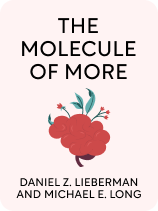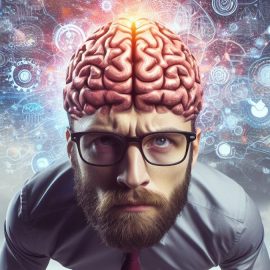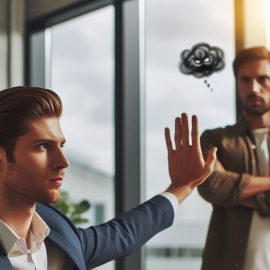

This article is an excerpt from the Shortform book guide to "The Molecule of More" by Daniel Z. Lieberman and Michael E. Long. Shortform has the world's best summaries and analyses of books you should be reading.
Like this article? Sign up for a free trial here.
How are dopamine levels and schizophrenia connected? What happens when you have too much dopamine?
Dopamine levels and schizophrenia are connected because higher dopamine increases creativity, and when taken to the extreme this can mean making creative associations between things that aren’t really related, feeding delusions. To understand how this happens, you need to take a look at how dopamine works.
Let’s investigate the role of dopamine in schizophrenia and when too much creativity is a bad thing.
How Dopamine Affects Creativity
Dopamine levels and schizophrenia are related because of creativity. Dopamine drives creativity—it motivates you to think about exciting possibilities for the future and how you could turn those possibilities into reality. Strong motivation toward a particular goal causes you to make connections between things that seem unrelated and come up with innovative new ideas—in other words, to be creative.
For example, say you’re getting frustrated trying to remove stubborn adhesive residue. You might remember that citric acid can dissolve glue (as in Goo Gone). From there, you can connect the ideas of “citric acid,” “lemon juice,” and “adhesive remover,” and realize that you can use lemon juice to clean up the sticky residue.
Dopamine, Creativity, and Mental Health
Although dopamine has the positive effect of driving creativity, it’s possible to have too much dopamine—to be too creative and start making connections between ideas that really are unrelated. This is a common feature of mental illnesses like schizophrenia and paranoia, where someone might imagine some massive conspiracy because they’re inventing connections between unconnected events.
(Shortform note: Some psychologists believe that conspiracy theories aren’t just random products of a brain with too much creativity and dopamine, but that they serve as a self-soothing anxiety response. If there’s a group secretly orchestrating events (for instance, the Illuminati are popular scapegoats), that means nothing is ever truly random; therefore, any future disaster can be predicted and prepared for. While belief in a global, nearly omnipotent group like the Illuminati might seem terrifying, some people find comfort in having a tangible enemy to fight instead of thinking they’re at the mercy of chance.)
This happens because dopamine is responsible for what psychologists call salience, which means how relevant something seems to you, personally. When your dopamine activity is too high, things can feel relevant to you when they actually aren’t. This could be as mundane as assuming that a coworker’s bad mood is a result of something you did, or as unusual as believing that a popular song is secretly about you.
| Dopamine’s Effects on Salience and Psychosis While some experts agree that dopamine is connected to mental illnesses such as schizophrenia, they add that not everyone with high dopamine levels develops psychotic symptoms, and treating patients for high dopamine levels doesn’t cure all the symptoms of schizophrenia. These researchers believe that elevated dopamine in specific areas of the brain causes those psychotic symptoms, that imbalances of other neurotransmitters must be involved, or both. Some studies have found that aberrant salience (thinking things are relevant when they aren’t) can be the result of heightened dopamine levels, and it’s an early indicator of psychosis. Mental health professionals can use evidence of aberrant salience to diagnose mental illnesses like schizophrenia before more serious symptoms emerge. However, this connection only applies in severe cases, such as the person who believes that popular songs are really about them. The other example from above—thinking people are upset with you when they really aren’t—is common and usually isn’t a sign of mental illness. |

———End of Preview———
Like what you just read? Read the rest of the world's best book summary and analysis of Daniel Z. Lieberman and Michael E. Long's "The Molecule of More" at Shortform.
Here's what you'll find in our full The Molecule of More summary:
- How dopamine drives ambitions, determines love, and influences thought
- What exactly dopamine is and how it affects us
- How some chemicals, like serotonin, actively work against dopamine






